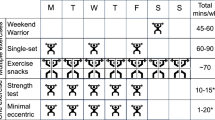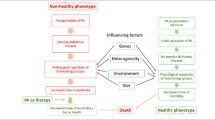Abstract
Background
Exercise adherence is a challenge for breast cancer patients receiving chemotherapy but few studies have identified the key barriers.
Purpose
In this paper, we report the barriers to supervised exercise in breast cancer patients participating in a randomized controlled trial.
Methods
Breast cancer patients initiating adjuvant chemotherapy (N = 242) were randomly assigned to usual care (n = 82) or supervised resistance (n = 82) or aerobic (n = 78) exercise. Participants randomized to the two exercise groups (n = 160) were asked to provide a reason for each missed exercise session.
Results
The two exercise groups attended 70.2% (5,495/7,829) of their supervised exercise sessions and provided a reason for missing 89.5% (2,090/2,334) of their unattended sessions. The 2,090 reasons represented 36 different barriers. Feeling sick (12%), fatigue (11%), loss of interest (9%), vacation (7%), and nausea/vomiting (5%) accounted for the most missed exercise sessions. Disease/treatment-related barriers (19 of the 36 barriers) accounted for 53% (1,102/2,090) of all missed exercise sessions. Demographic and medical variables did not predict the types of exercise barriers reported.
Conclusions
Barriers to supervised exercise in breast cancer patients receiving chemotherapy are varied but over half can be directly attributed to the disease and its treatments. Behavioral support programs need to focus on strategies to maintain exercise in the face of difficult treatment side effects.
Similar content being viewed by others
References
Courneya KS, Karvinen KH, Vallance JKH. Exercise motivation and behavior change. In: Feuerstein M, ed. Handbook of Cancer Survivorship. New York, NY: Springer; 2007; 113–132.
Markes M, Brockow T, Resch KL: Exercise for women receiving adjuvant therapy for breast cancer. Cochrane Database of Systematic Reviews. 2006; 4: CD005001.
McNeely ML, Campbell KL, Rowe BH, et al. Effects of exercise on breast cancer patients and survivors: A systematic review and meta-analysis. Can Med Assoc J. 2006; 175: 34–41.
Courneya KS, Segal RJ, Mackey JR, et al. Effects of aerobic and resistance exercise in breast cancer patients receiving adjuvant chemotherapy: A multicenter randomized controlled trial. J Clin Oncol. 2007; 25: 4396–4404.
Godin G, & Shephard RJ. A simple method to assess exercise behavior in the community. Can J Appl Sport Sci - Journal Canadien des Sciences Appliquees au Sport. 1985; 10: 141–146.
Ajzen I. The theory of planned behavior. Org Behav Human Decis Process. 1991; 50: 179–211.
Ajzen I: Constructing a TpB Questionnaire. Available at: http://www.people.umass.edu/aizen/tpb.html. Accessed on August 27, 2007.
Martin K, Sinden A. Who will stay and who will go? A review of older adults’ adherence to randomized controlled trials of exercise. J Aging Phys Act. 2001; 9: 91–114.
Cooper H. The role of physical activity in the recovery from breast cancer. Melpomene. 1995; 14: 18–20.
Courneya KS, Friedenreich CM. Determinants of exercise during colorectal cancer treatment: An application of the theory of planned behavior. Oncol Nurs Forum. 1997; 24: 1715–1723.
Courneya KS, Friedenreich CM. Utility of the theory of planned behavior for understanding exercise during breast cancer treatment. Psycho-Oncol. 1999; 8: 112–122.
Karvinen KH, Courneya KS, Campbell KL, et al. Correlates of exercise motivation and behavior in a population-based sample of endometrial cancer survivors: An application of the theory of planned behavior. International Journal of Behavioral Nutrition and Physical Activity. 2007; 4: 21.
Leddy SK. Incentives and barriers to exercise in women with a history of breast cancer. Oncol Nurs Forum. 1997; 24: 885–890.
Schwartz AL. Patterns of exercise and fatigue in physically active cancer survivors. Oncol Nurs Forum. 1998; 25: 485–491.
Courneya KS, Vallance JKV, Jones LW, Reiman T. Correlates of exercise intentions in non-Hodgkin’s lymphoma survivors: An application of the Theory of Planned Behavior. J Sport Exerc Psychol. 2005; 27: 335–349.
Courneya KS, Friedenreich CM, Quinney HA, et al. A longitudinal study of exercise barriers in colorectal cancer survivors participating in a randomized controlled trial. Annals Behav Med. 2005; 29: 147–153.
Brawley LR, Culos-Reed SN, Angove J, Hoffman-Goetz L. Understanding the barriers to physical activity for cancer patients: Review and recommendations. J Psychosoc Oncol. 2002; 20: 1–21.
Acknowledgment
This study was funded by a grant from the Canadian Breast Cancer Research Alliance. KSC is supported by the Canada Research Chairs Program. RDR is supported by a New Investigator Award from the Heart and Stroke Foundation of Canada. CMF is supported by a New Investigator Award from the Canadian Institutes of Health Research (CIHR) and a Health Scholar Award from the Alberta Heritage Foundation for Medical Research (AHFMR). JKV was supported by a Canada Graduate Scholarship from CIHR and an Incentive Award from AHFMR. The authors gratefully acknowledge Lisa Workman, MA, Neil Eves, PhD, John McGavock, PhD, Kristin Campbell, PhD, Margaret McNeely, BScPT, MSc, Diana Jespersen, RN, Chris Scott, BSc, Lianne Dolan, MSc., Ben Wilson, BSc, Christopher Sellar, MS, and Diane Cook, BPE for their assistance with the trial.
Author information
Authors and Affiliations
Corresponding author
Additional information
Rapid Communication Accepted by Annals of Behavioral Medicine (October 8, 2007).
About this article
Cite this article
Courneya, K.S., McKenzie, D.C., Reid, R.D. et al. Barriers to Supervised Exercise Training in a Randomized Controlled Trial of Breast Cancer Patients Receiving Chemotherapy. ann. behav. med. 35, 116–122 (2008). https://doi.org/10.1007/s12160-007-9009-4
Received:
Published:
Issue Date:
DOI: https://doi.org/10.1007/s12160-007-9009-4




